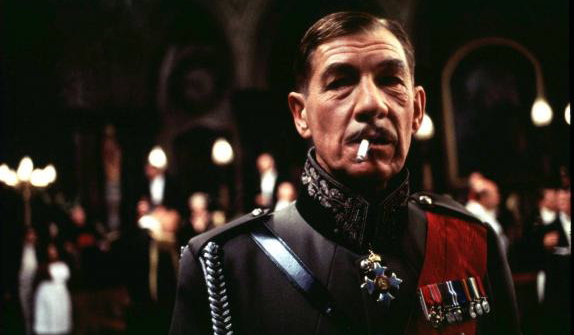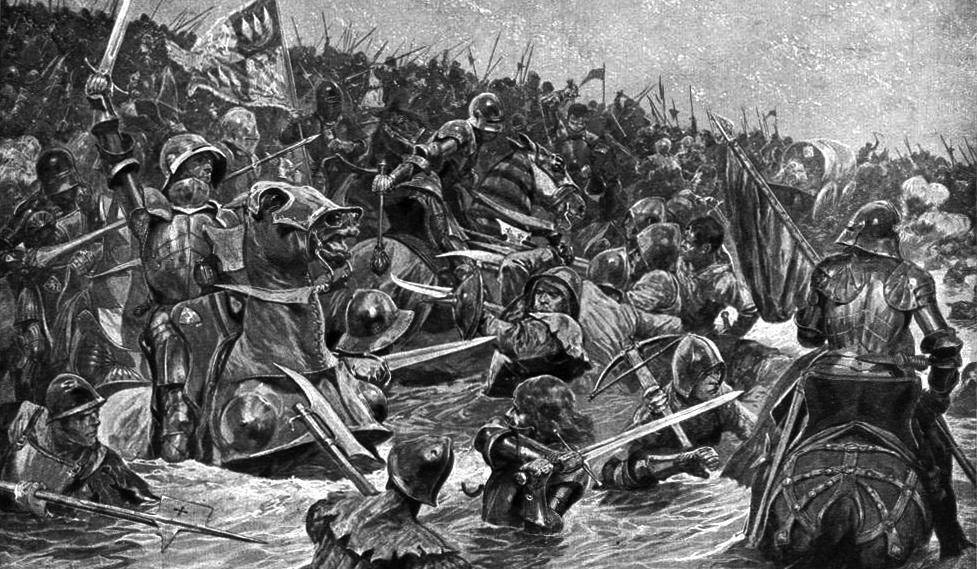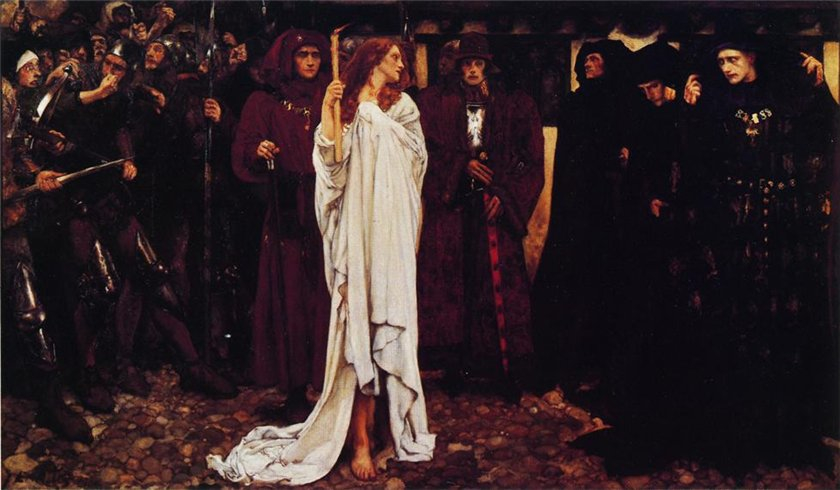
Growing up, Shakespeare's Richard III was always a family favorite. My parents spent their courtship studying Shakespeare and botany at Southern Oregon College, and their reading of Richard with a particularly charismatic and inspiring young professor led my father, at least, to spend a good deal of time writing on the play. In the last few years we've taken a family excursion to Ashland to prowl their old haunts (and see Richard) and when I was in London I thought of them while visiting the recreated Shakesepare's Globe Theatre (where I stood with the groundlings to watch—what else?—Richard). So while I personally haven't studied this play in a classroom setting, I do have a long history with it, and the parts that have always thrilled me continue to do so. Richard's famous "Was ever woman in this humour woo'd?" speech, for example, will never get old; the language and Richard's diabolical self-satisfaction are just fantastic. Richard himself is one of the great villains of the stage, and it's always a satisfying mixture of fun and horror to watch him dismantle his family and the tenuous peace established by his brother's accession to the throne. This time around, however, a few aspects of the play struck me differently or more forcibly than before.
In particular, those who read my paean to the Margaret character in Henry VI Part 3 will be unsurprised that a reading of the Henry VI trilogy affected my understanding of the Margaret who appears in Richard III. Until now I had always perceived her as a victim—a wronged wraith who hovers on the edges of the action, cursing and prophesying the House of York from a place of righteousness. And indeed she is legitimately a victim, her husband and son having been murdered by Richard; but she was also, in a former life, one of his primary rivals for title of Villain. She is, still, the bloodthirsty woman who murdered Rutland and soaked a handkerchief in his blood with which to taunt his father. Margaret is not Clytemnestra, dragged into evil by the sacrifice of her children. Her harshness and ferocity may feed on the deaths of her son and husband, but did not begin with those deaths—she and Richard are both artifacts of the wars that have shaped them. This makes her prolific and highly accomplished cursing of the York allies a more complex proposition: at this point, despite her hatred for Richard, she is almost collaborating with him to keep the warlike spirit of enmity alive. Neither of the two are formed to pass away the time "in this weak piping time of peace." This is particularly evident in Margaret's final scene, when she is unable to mourn with the York women and instead exults in their grief, offering thanks to God that their children are killing one another:
QUEEN MARGARET (to the Duchess of York)
From forth the kennel of thy womb hath crept
A hell-hound that doth hunt us all to death:
That dog, that had his teeth before his eyes,
To worry lambs, and lap their gentle blood;
That foul defacer of God's handiwork:
That excellent grand tyrant of the earth,
That reigns in galled eyes of weeping souls,—
Thy womb let loose, to chase us to our graves.—
O upright, just, and true-disposing God,
How do I thank thee, that this carnal cur
Preys on the issue of his mother's body,
And makes her pew-fellow with others' moan!
DUCHESS OF YORK
O Harry's wife, triumph not in my woes!
God witness with me, I have wept for thine.
QUEEN MARGARET
Bear with me; I am hungry for revenge,
And now I cloy me with beholding it.
That final line, "now I cloy me with beholding it," is a great example of the richness of Shakespeare's language, since "cloy" carries not only the most obvious meaning opposing it to "hungry" ("To satiate, surfeit, gratify beyond desire; to disgust, weary (with excess of anything)" [OED, from 1530]), but also the connotations of "pierce as with a nail, to gore" (OED, from 1590) and "to stop up, block, obstruct, choke up" (OED, from 1548). Margaret's insatiable desperation for revenge, therefore, is sickening her even as it fails to satisfy her hunger; it's also duplicating the same stabbing, piercing act on her, that Richard perpetrated on her husband and she on his brother. And if the wound or cavity produced by this stabbing might be expected to free any of her demons and let her move beyond her grief, that hope is dashed by the "blockage" sense of "cloying": she is hemmed into her own vitriol even as she departs for France. She is fierce, but she is also ruined, and—this is the part I never understood before—as she implies by her own reflexive construction, she's largely brought it on herself, in her craving for power and violence, and then for revenge. "I cloy ME with beholding it."
When my folks and I saw Richard III in Ashland in 2005, all the women were played as a kind of spectral Greek chorus, lamenting upon the war crimes of the men. This was pretty effective, especially given all the anti-war sentiment in the air at the time over the US invasions of Afghanistan and Iraq. In context, though, Margaret is as responsible as any for the years of war behind her. The fact that she has genuinely suffered as a result of said wars, that she has lost her son to violence, makes the situation more complicated but does not change her past actions or, apparently, her basic character. When Elizabeth pleads with her to "teach me how to curse my enemies" (and you can see why she might, since every single one of Margaret's curses comes true), Margaret's answer underlines the cost of her commitment to vengeance:
Forbear to sleep the night, and fast the day;
Compare dead happiness with living woe;
Think that thy babes were fairer than they were,
and he that slew them fouler than he is:
Bettering thy loss makes the bad causer worse;
Revolving this will teach thee how to curse.
Remaining faithful to revenge requires harming one's present self (sleeplessness, starvation), and destroying one's possibility of hope for a better future. What's more, it requires a relentless alteration of history, one that demonizes the hated rival, exaggerating his misdeeds and ignoring one's own. In contrast, Richard's witty, twisted repartee seems positively light-hearted—at least, until he wakes up in the night tormented by dreams of his dead victims.
The dreams, indeed, were another aspect of Richard III that really struck me this time through, to the extent that I'm not sure how I could have failed to appreciate them before. In addition to Richard's haunted nightmares before the battle of Bosworth Field, we have Hastings' prophetic dream of the boar showing its tusks, and, most memorably for me, Clarence's gorgeous retelling of his nightmare of drowning:
Lord, Lord! methought, what pain it was to drown!
What dreadful noise of waters in mine ears!
What ugly sights of death within mine eyes!
Methought I saw a thousand fearful wracks;
Ten thousand men that fishes gnaw'd upon;
Wedges of gold, great anchors, heaps of pearl,
Inestimable stones, unvalued jewels,
All scatt'red in the bottom of the sea:
Some lay in dead men's skulls; and, in those holes
Where eyes did once inhabit, there were crept,
As 'twere in scorn of eyes, reflecting gems,
That woo'd the slimy bottom of the deep,
And mockt the dead bones that lay scatt'red by.
The line "Methought I saw a thousand fearful wracks" recalls, to me, Margaret's "Was I for this nigh wrackt upon the sea?" speech in Henry VI Part 2—and her "tears as salt as sea" have here swollen to comprise an entire ocean, the weeping eyes mere hollowed sockets. This kind of expansion, indeed, reflects the way in which by this point the whole apparatus of the previous plays is swelling and foundering, as Richard kills off family members and alienates former allies until none remain. By this point, I truly felt both the epic scope and the pathos of the characters in a way I mostly didn't throughout the Henry VI plays; Shakespeare here is hitting his stride.



